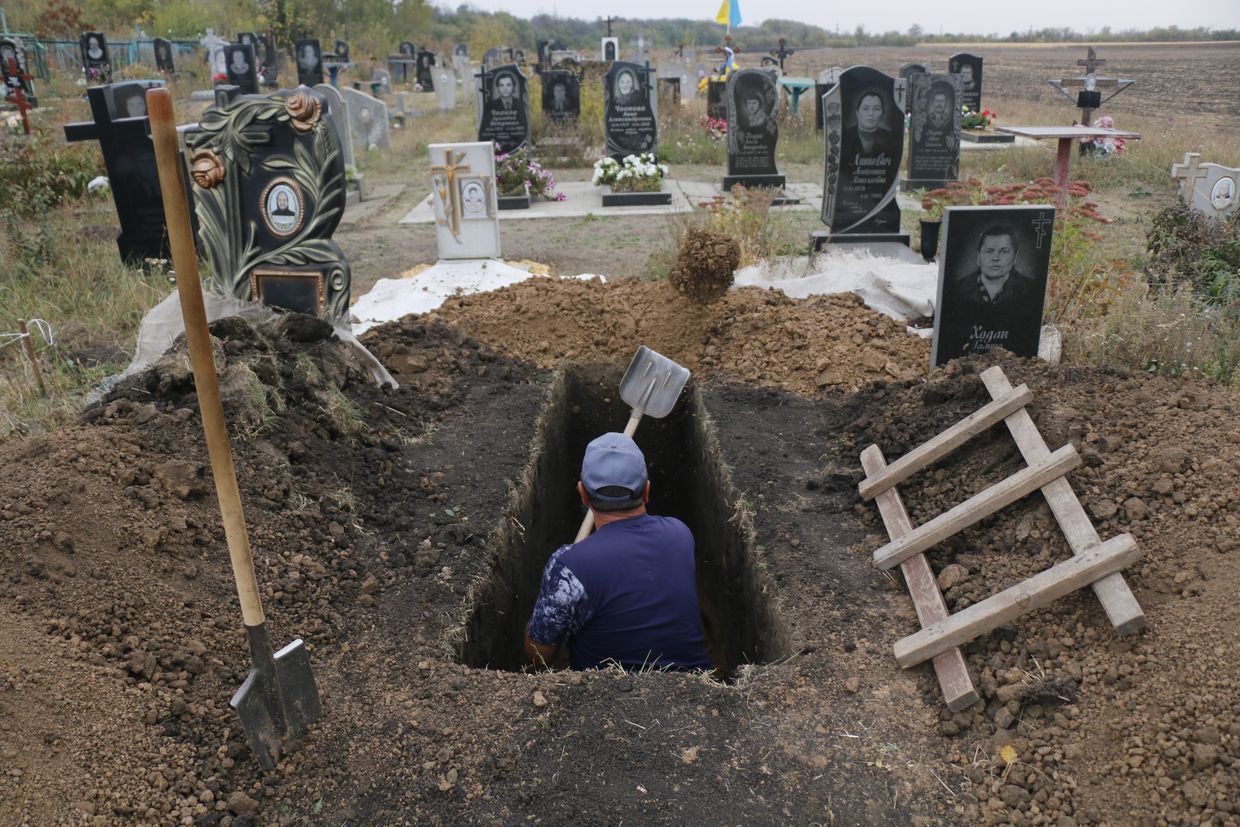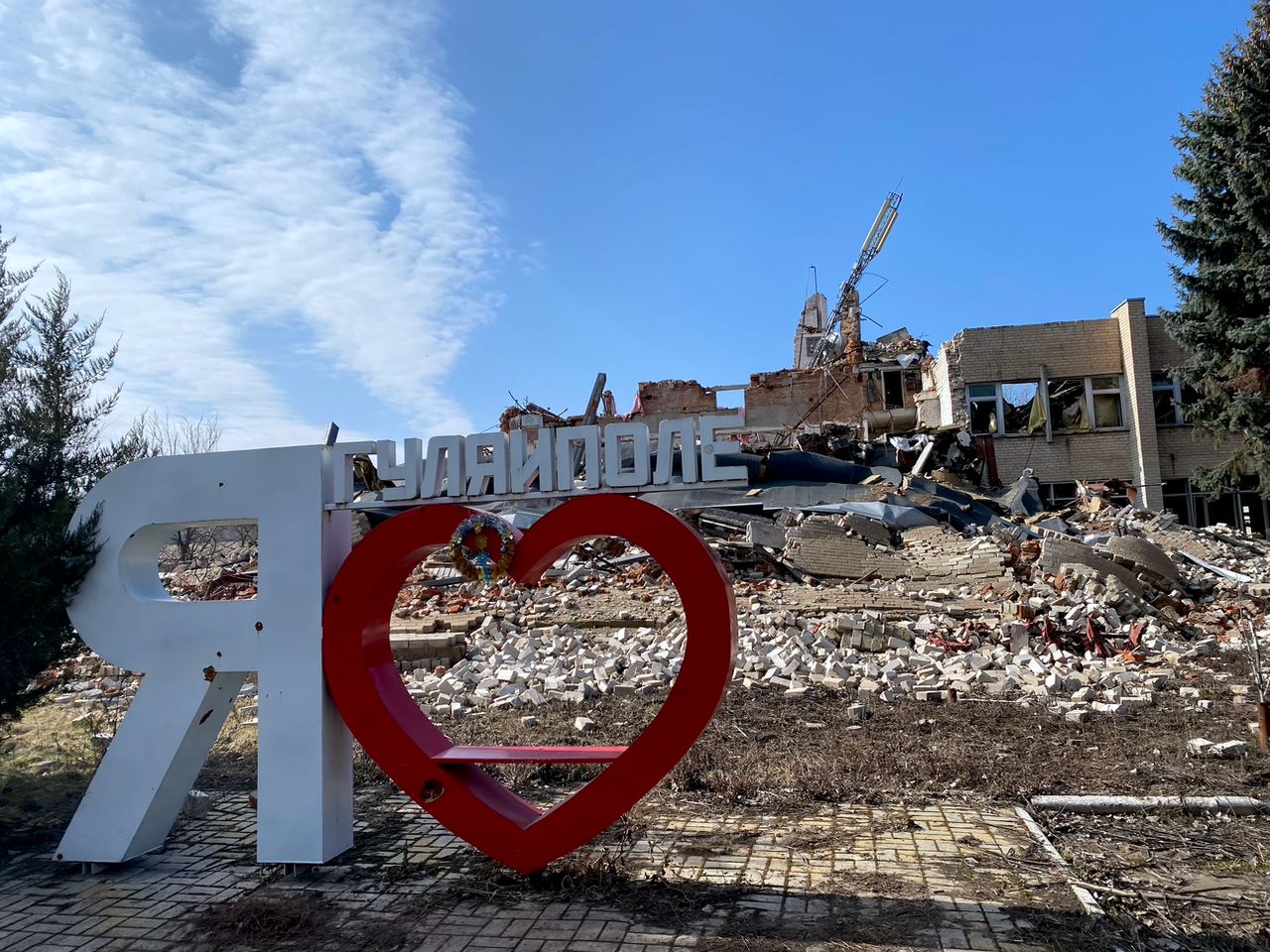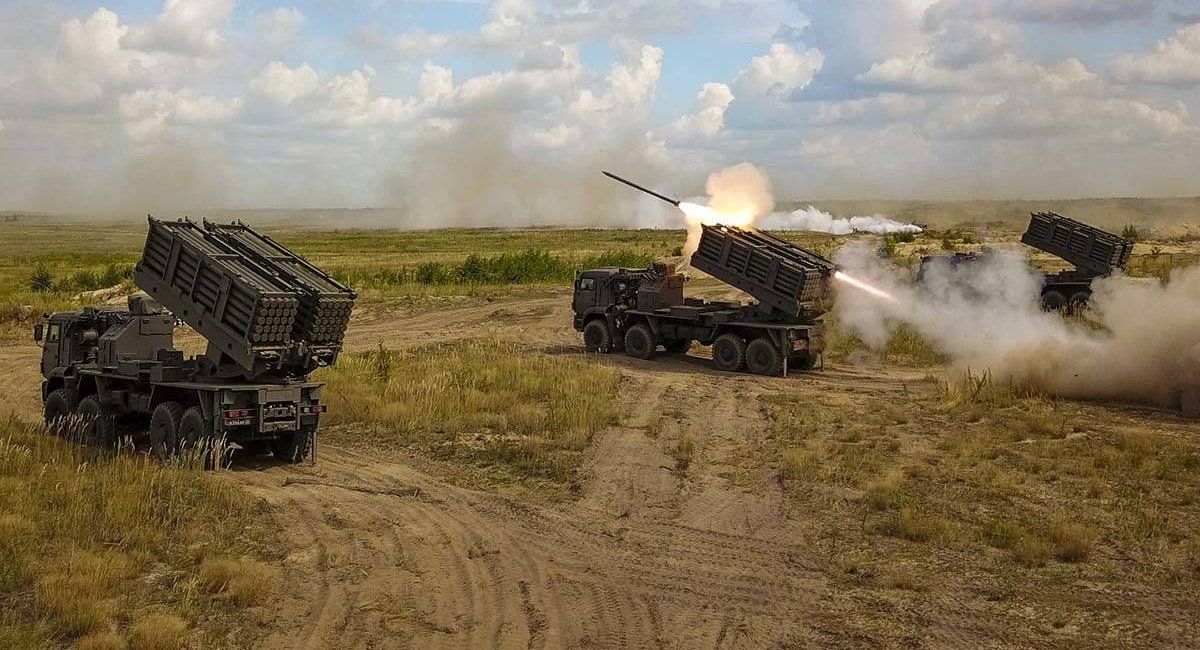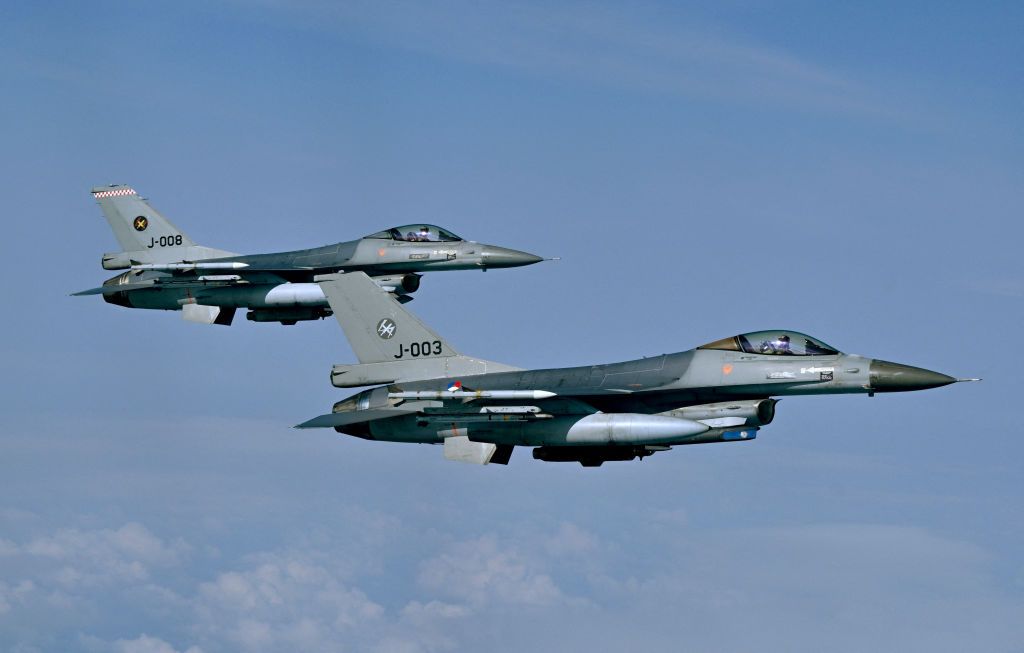Ukraine war latest: NATO ministers meet to talk Ukraine aid; death toll of Hroza strike rises
Key developments on Oct. 11:
- Zelensky makes surprise visit to NATO defense ministers' meeting in Brussels
- Russia attacks school in Dnipropetrovsk Oblast's Nikopol, killing 2
- Austin: F-16s could arrive in Ukraine as early as next spring
- International donors pledge up to $530 million to Ukraine in demining assistance
- Canada presents new aid package for Ukraine that includes munitions, winter equipment
- Death toll in Oct. 5 strike on Hroza village in Kharkiv Oblast rises to 55; authorities name alleged collaborators who helped Russians pick the target
The death toll of the Oct. 5 Russian missile strike against the village of Hroza in Kharkiv Oblast has risen to 55, Dmytro Chubenko, the spokesperson of the regional prosecutor's office, said on Oct. 11, Ukrinform reported.
Two more victims were identified by a DNA test over the past day, he said.
"Two more women, who were previously considered missing, were identified to be among the dead," Chubenko told reporters.
The official said that the identification of bodies is ongoing, and the death toll can increse to 58, as three more people are currently considered missing. The identification process is difficult due to extensive injuries to the victims' bodies.
On Oct. 5, a Russian Iskander ballistic missile hit a grocery store and a cafe in Hroza during a memorial service for a fallen soldier who was being reburied in the village.
A week after the strike, the Security Service of Ukraine (SBU) named two Ukrainian collaborators who allegedly assisted Russian forces with the attack. The two are wanted in Ukraine.
The alleged collaborators are brothers Volodymyr Mamon, 30, and Dmytro Mamon, 23. Both locals from Kharkiv Oblast, they began working with Russian forces during the occupation of the area, the SBU claimed.
Following the region's liberation in late 2022, the brothers fled to Russia, where they continued collaborating with Russia, creating a network of local informants and other contacts.
The brothers used these contacts to identify Ukrainian troop movements or gatherings, which they reported to their Russian controllers. According to the SBU, they often used unwitting informants, whom they asked seemingly innocent questions.
The SBU alleges that the brothers explicitly worked to gather information about the memorial service for a fallen soldier who was being reburied in Hroza, then provided these details to Russian forces.
Zelensky makes surprise visit to NATO defense ministers' meeting in Brussels
In a surprise visit, President Volodymyr Zelensky arrived at NATO headquarters this morning as alliance officials prepared for the 16th Ramstein-format meeting of the Ukraine Defense Contact Group and a session of the Ukraine-NATO Council, the first with Zelensky attending in person.
Ukrainian leaders and NATO defense ministers convened in Brussels on Oct. 11 for a two-day summit to mobilize allied support for Kyiv in the coming winter.
Ukraine's main defense partners announced major new military aid packages for Ukraine, including Belgium, which joined Denmark, the Netherlands, and Norway in the so-called "fighter jet coalition," pledged to deliver an unspecified number of F-16 combat aircraft to Ukraine starting from 2025.
In a short press conference with NATO Secretary-General Jens Stoltenberg, Zelensky said he planned to discuss various issues but stressed that one of the priorities remains air defense systems in anticipation of a new campaign of Russian missile strikes against Ukrainian energy infrastructure over winter.
Russian forces on Sept. 21 already launched their first mass strike against Ukraine's energy infrastructure in six months. Ukrainian officials warned that Russia will seek to cripple the country's power grid with large-scale attacks, as it had attempted during the fall and winter of 2022-2023.
Stoltenberg closed day one of the defense ministerial meeting on Oct. 11, welcoming allies’ newly pledged military aid for Ukraine, including F-16 fighter jets, crucial air defense systems for winter, and much-needed ammunition.
Some new pledges include the U.S.’s more than $200 million of aid in air defense, artillery, and rocket ammunition and Germany’s one billion-euro package that includes powerful Patriot and IRIS-T air defense systems.
In a tweet by Zelensky right after the day’s end, the president thanked allies, particularly Croatia, Sweden, Poland, Greece, and Latvia, for “powerful decisions on military aid for Ukraine and reaffirming earlier commitments” at the meeting.
“The international coalition works to ensure our common victory,” Zelensky said.

Russia attacks school in Dnipropetrovsk Oblast's Nikopol, killing 2
Russia launched a missile strike against a high school building in Nikopol, Dnipropetrovsk Oblast, on Oct. 11, killing four adults, reportedly the school's employees, Governor Serhii Lysak reported.
According to the governor, two men aged 24 and 71 were also injured.
The school sustained serious damage. Lysak reported that the strike also affected 42 houses, 18 commercial buildings, an infrastructure facility, 17 solar panels, a shop, and a car.
The city of Nikopol lies at the mostly dried-up Kakhovka Reservoir, just across the Russian-occupied Enerhodar and Zaporizhzhia Nuclear Power Plant. It is a regular target of Russian attacks.
Nikopol and the surrounding area were targeted several times with artillery and drones over the past day, resulting in damage to multiple buildings and a 78-year-old woman injured, the governor said earlier.
International donors pledge up to $530 million to demine Ukraine
Participants of the International Donor Conference on Humanitarian Demining in Ukraine pledged almost 500 million euros ($530 million) to Kyiv in demining assistance, the Croatian news agency HINA reported on Oct. 11, citing Croatia's Interior Minister Davor Bozinovic.
The two-day conference that started in Zagreb on Oct. 11 serves as a platform for Kyiv's partners to mobilize resources for Ukraine's recovery efforts with a particular focus on humanitarian demining.
On Oct. 10, Croatia signed a bilateral agreement with Ukraine on joint demining operations in the war-torn country.
Specifics of the agreement included the transfer of technical expertise and special safety equipment, as well as educational programs for civilians and capability development.
Croatia has also disbursed over $1 million for demining operations in Ukraine.
Interior Minister Ihor Klymenko said on March 1 that nearly one-third of Ukraine's territory had been mined since the start of the full-scale invasion.
According to Prime Minister Denys Shmyhal, 250 people have been killed by mines in Ukraine since the start of the full-scale war, and over 500 have been injured or maimed.
The State Emergency Service earlier reported that after the end of the war, Ukraine would need at least ten years to demine its territory.
Austin: F-16s could arrive in Ukraine next spring
Ukraine could receive F-16 fighter jets as early next spring, U.S. Secretary of Defense Lloyd Austin said on Oct. 11 at a press conference at the NATO headquarters in Brussels.
“As we look at what it will take to provide initial capability, this will take months, as we've said before. The earliest is next spring when we can begin to see additional capability,” Austin said in response to a question from the Kyiv Independent.
The projection comes nearly two months after Washington first approved the third-party transfer of U.S.-made F-16s to Ukraine after Ukrainian pilots completed training.
Austin said the training, taking place in Europe and the U.S., was ongoing. He did not specify when it was expected to end.
Secretary General Jens Stoltenberg said on Oct. 11 that Belgium and Denmark confirmed the planned delivery of F-16s to Ukraine, without citing how many they were sending.
Regarding 300-kilometer-range Army Tactical Missile Systems (ATACMS), which the U.S. has reportedly already decided to deliver to Ukraine, Austin said there was no news yet.

Instead, the U.S. is focused on equipment that it believes Ukraine needs and those addressed by Zelensky, which include additional air defense and artillery ammunition, according to Austin.
“And that focus, I think, has been very, very instrumental in making sure that President Zelensky can protect his cities and also protect his troops,” Austin said.
Asked about Ukraine’s four-month-old counteroffensive, Austin said that Ukrainian forces were making “steady progress.”
“We've been very impressed by the determination, by the valor of the Ukrainian forces,” Austin said.
“And we will continue to focus on providing the forces and the leadership those things that they need to be successful in this fight on the battlefield.”
Belgium will provide Ukraine with several F-16 fighter jets, with the first ones expected to arrive in 2025, Belgian Defense Minister Ludivine Dedonder told RTL info on Oct. 11.
The minister did not specify the number of the planes Belgium intends to send but said that the transfer will depend on "the build-up of our new F-35 capabilities."
Ukrainian pilots will receive training in Belgium, Denmark, and several other EU countries, Dedonder said.
Ukraine's Defense Minister Rustem Umerov discussed the provision of F-16s and the training of pilots with Dedonder in a phone call on Oct. 10.
Kyiv has placed high hopes on the fighter jets, which could shift the balance in the war by lending the Ukrainian military air superiority in the occupied territories.















